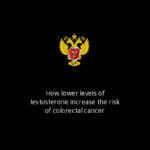What biomarkers are associated with an increased risk of developing colorectal cancer?
There are several biomarkers that are associated with an increased risk of developing colorectal cancer. These include:
1.. Genetic mutations: Mutations in genes such as APC, TP53, KRAS, BRAF, and others have been linked to an increased risk of developing colorectal cancer.
2. Microsatellite instability: This is a type of genetic instability that can lead to errors in DNA replication and repair, and is associated with an increased risk of developing colorectal cancer.
3. Abnormal levels of certain proteins: Elevated levels of certain proteins, such as carcinoembryonic antigen (CEA), have been associated with an increased risk of developing colorectal cancer.
Carcinoembryonic antigen (CEA) is a protein that is normally produced in very low levels by cells during fetal development, but its production is minimal or absent in healthy adult tissues. However, certain types of cancer cells, including colorectal cancer cells, can produce large amounts of CEA. Here’s why increased levels of CEA are associated with an increased risk of colorectal cancer:
- Tumor Marker: CEA is considered a tumor marker because elevated levels of this protein can indicate the presence of cancerous tissue. In colorectal cancer, the tumor cells produce CEA, leading to higher levels of this protein in the bloodstream.
- Diagnostic Marker: CEA is often used as a diagnostic marker for colorectal cancer. Blood tests that measure CEA levels can help detect the presence of colorectal cancer, monitor the effectiveness of treatment, and assess for cancer recurrence after treatment.
- Prognostic Indicator: Elevated CEA levels in patients with colorectal cancer are associated with a poorer prognosis. Studies have shown that patients with higher baseline CEA levels before treatment tend to have more advanced disease, larger tumors, and a higher likelihood of cancer recurrence and metastasis.
- Monitoring Disease Progression: Monitoring CEA levels over time can provide valuable information about disease progression and response to treatment in patients with colorectal cancer. A decrease in CEA levels after treatment may indicate a positive response to therapy, while increasing or persistently elevated levels may suggest disease recurrence or progression.
- Predicting Treatment Response: CEA levels can also help predict response to treatment in colorectal cancer patients. Patients with elevated CEA levels before surgery or chemotherapy may have a higher likelihood of incomplete tumor resection or resistance to treatment, leading to poorer outcomes.
Increased levels of CEA in the bloodstream serve as a marker of colorectal cancer activity and can help guide clinical decision-making regarding diagnosis, treatment, and monitoring of the disease. However, it’s important to note that elevated CEA levels can also occur in other conditions, such as inflammatory bowel disease, pancreatitis, and liver disease, so CEA testing should be interpreted in the context of the patient’s clinical history and other diagnostic findings.
4. Inflammatory biomarkers: Chronic inflammation has been linked to an increased risk of developing colorectal cancer. Biomarkers of inflammation, such as C-reactive protein (CRP), may be used to help identify individuals at higher risk.
C-reactive protein (CRP) is an acute-phase reactant produced by the liver in response to inflammation, infection, or tissue damage. Elevated levels of CRP are often indicative of systemic inflammation. The connection between increased CRP levels and colorectal cancer risk can be explained through several mechanisms:
- Chronic Inflammation: Chronic inflammation plays a crucial role in the development and progression of colorectal cancer. Elevated CRP levels reflect ongoing inflammation in the body, which can contribute to the initiation and promotion of cancerous changes in the colon and rectum.
- Tumor Microenvironment: Inflammatory cells and cytokines present in the tumor microenvironment can stimulate the production of CRP. Tumor-associated inflammation promotes cancer cell proliferation, angiogenesis, and metastasis, fostering an environment conducive to tumor growth.
- Immune Dysregulation: Chronic inflammation mediated by elevated CRP levels may impair immune surveillance mechanisms that normally help eliminate cancerous cells. This immune dysregulation allows tumor cells to evade detection and clearance by the immune system, facilitating tumor progression.
- Interaction with Risk Factors: CRP levels often correlate with other risk factors for colorectal cancer, such as obesity, smoking, and poor dietary habits. These factors contribute to systemic inflammation and elevated CRP levels, further exacerbating the risk of colorectal cancer development.
- Predictive Marker: Elevated CRP levels have been associated with an increased risk of colorectal cancer development in epidemiological studies. Measuring CRP levels may serve as a predictive marker for identifying individuals at higher risk of developing colorectal cancer, prompting further evaluation and monitoring.
Increased CRP levels reflect systemic inflammation, which contributes to the promotion of colorectal cancer through various pathways involving chronic inflammation, immune dysregulation, and interactions with other risk factors. Monitoring CRP levels may provide valuable insights into the inflammatory status of individuals and their potential risk for colorectal cancer development
5. Fecal occult blood: Blood in the stool may be a sign of colorectal cancer, and tests for fecal occult blood may be used to screen for the disease.
It is important to note that having one or more of these biomarkers does not necessarily mean that an individual will develop colorectal cancer. Regular screening for colorectal cancer is recommended for individuals who are at higher risk due to factors such as age, family history, or personal medical history. If you are experiencing symptoms such as changes in bowel habits, rectal bleeding, abdominal pain, or unexplained weight loss, it is important to speak with a healthcare provider for evaluation and guidance.
Verified by: Dr.Diab (March 29, 2024)
Citation: Dr.Diab. (March 29, 2024). What biomarkers are associated with an increased risk of developing colorectal cancer. Medcoi Journal of Medicine, 3(2). urn:medcoi:article32978.














There are no comments yet
Or use one of these social networks